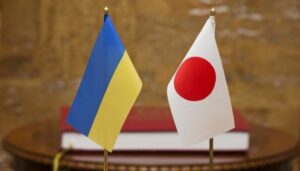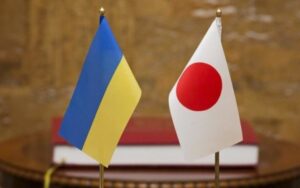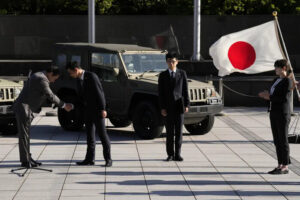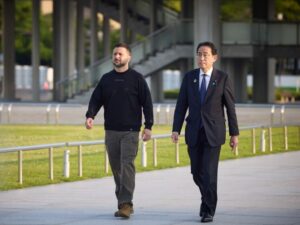
Japanese Foreign Minister Hayashi Yoshimasa has announced the transfer of 24 crane trucks to Ukraine to help clear the territory of unexploded ordnance and two powerful transformers in preparation for winter.
“Last year, Russian attacks on infrastructure forced Ukrainians to live without electricity and heating. In this context, it is very important to prepare well for the winter. I have informed that Japan is handing over two large transformers by the end of September as an aid. Also, today there will be a ceremony of handing over 24 trucks with cranes to help clear the territory of ammunition,” he said at a joint press conference with Ukrainian Foreign Minister Dmytro Kuleba.
He also said that the Japanese government has decided to reopen the Japan International Cooperation Agency (JICA) office in Kyiv in the near future.
Hayashi Yoshimasa also welcomed Ukraine’s efforts to establish long-term peace in the country, including President Zelensky’s “peace formula”.
“We have agreed with Minister Kuleba that Ukraine and Japan will work together to call on the international community, including the Global South, to achieve this goal,” the Japanese Foreign Minister said.
In addition, he noted that during today’s meeting with Ukrainian President Volodymyr Zelenskyy, they agreed to start negotiations on a separate bilateral document between Ukraine and Japan based on the G7 Joint Declaration of Support for Ukraine.
“We will coordinate to ensure that the first round of consultations takes place as soon as possible,” the minister said.
The Japanese minister also said that he had visited the town of Bucha in Kyiv region.

Japan’s financial, humanitarian and technical assistance to Ukraine has already exceeded 7.6bn dollars. Japan’s financial, humanitarian and technical assistance to Ukraine has already exceeded 7.6bn dollars, Verkhovna Rada Speaker Ruslan Stefanchuk has said.
“Ukraine is grateful to all G7 countries, especially Japan, which is chairing the G7 this year, for its consistent position in support of the territorial integrity and sovereignty of our state. We are grateful to Japan for its principled position in the UN structures, in particular, as a non-permanent member of the Security Council. Ukraine is grateful to Japan for its unprecedented decisions to provide non-lethal military assistance and for receiving Ukrainian evacuees. We are immensely grateful for Japan’s financial, humanitarian and technical assistance, which has already exceeded 7.6 billion dollars. The Ukrainian parliament speaker said in a statement at a press conference at the National Press Club of Japan on Thursday.
Stefanchuk also expressed gratitude to the Japanese side for consistent cooperation with Ukrainian and foreign partners to bring the aggressor to justice.
“The investigation of the UN International Court of Justice, the Special Tribunal for the Crime of Aggression against Ukraine, the International Center for the Punishment of the Crime of Aggression in The Hague, the Register of Damage Caused by Aggression and the Compensation Fund are the main tools on this path. Russia must be stopped. Criminals must realize that punishment is inevitable,” he stressed.
In addition, the head of the VR noted that Ukraine counts on Japan’s support not only during the war, but also in times of peace, as Ukraine will need assistance and investments for post-war reconstruction of the destroyed economy.
“We would also like to utilize Japan’s incredible experience in rebuilding after wars and natural disasters. Therefore, I am pleased to welcome Japanese government agencies and companies to Ukraine to work together,” the speaker added.
As reported, on September 6-10, Chairman of the Verkhovna Rada of Ukraine Ruslan Stefanchuk is on a working visit to Japan. In Tokyo, the speaker will take part in the parliamentary summit of the G7 countries (G7). He has been invited as a special guest of the summit. The program of the visit includes a number of bilateral meetings and Stefanchuk’s speech before the participants of the G7 parliamentary summit.
The working visit of the speaker of the Ukrainian parliament takes place against the background of an active dialog with Japan on Ukraine’s support in countering the Russian aggressor (in 2023 Japan will chair the G7).
Among the main goals of the visit are to strengthen the assistance to Ukraine from the G7 countries, to complement the efforts of the President and the Government of Ukraine and to expand cooperation with the parliaments of the G7 countries.
In addition, the aim is to strengthen bilateral relations between Japan and Ukraine and expand cooperation.

Japan will provide up to $7 billion in aid to Ukraine, Japanese Prime Minister Fumio Kishida said, speaking online at the 3rd Summit of the International Crimean Platform in Kyiv.
“Japan will continuously provide (Ukraine – IF-U) with a variety of assistance in the amount of up to $7 billion, depending on the needs,” he said.
In addition, Japan will use its experience and expertise in post-war reconstruction and disaster recovery to provide assistance, he said.
Kishida reiterated that Japan has consistently supported the sovereignty and territorial integrity of Ukraine, including Crimea, and will continue to work closely with the international community, particularly the G-7 countries, and join sanctions against Russia to provide continued support to Ukraine.
“I visited Kyiv and Bucha in March of this year and witnessed the tragedy with my own eyes. This confirmed my belief that Russia’s aggression against Ukraine is an extraordinary act that violates the foundations of the international order,” he said.
As Kishida emphasized, “Japan is on the side of the people of Ukraine to ensure peace and bring it back to the beautiful Ukrainian land.”

Ukraine’s state budget on Thursday received a $1.5 billion concessional loan through the World Bank’s Trust Fund mechanism under guarantees from the Japanese government, the Finance Ministry said.
“The raised funding will be used to restore the economy and strengthen social protection of the population,” the release quoted Finance Minister Serhiy Marchenko as saying, thanking the WB and Japan for the allocation of funds.
The Finance Ministry recalled that since the beginning of Russia’s full-scale invasion, Ukraine has received more than $581 million in concessional financing from the Japanese government through the Japan International Development Agency (JICA).
“This year, the Japanese government is expected to provide another $2 billion in direct budget support through the World Bank Trust Fund,” the ministry added.
As previously indicated by the Ministry of Finance, as of July 21 this year, Ukraine’s state budget received funding from international partners in the amount of $23.6 billion, compared to $32.1 billion last year, with a need for this year of about $42 billion.
Since then, the budget has also received EUR1.5bn of the sixth tranche of EU macrofinancial aid.

The Ministry of Defense of Japan held a ceremony of transferring to Ukraine 100 vehicles and 30,000 ready-made food rations for the needs of the Armed Forces of Ukraine, the Ukrainian Ambassador to Japan Sergey Korsunsky said.
“Today in the Ministry of Defense of Japan there was a ceremony of handing over to Ukraine 100 vehicles and 30,000 ready-made food rations for the needs of the Armed Forces of Ukraine. The first two vehicles are already on their way to Ukraine, the others will be sent after passing the technical inspection and necessary preparation,” he wrote on Facebook.
The ambassador stressed that for the first time in Japan’s post-war history, the Self-Defense Forces are transferring military equipment to a belligerent country.
“Continuation follows,” Korsunsky added.

Ukraine and Japan will hold a joint conference on the reconstruction of Ukraine, President Vladimir Zelensky said on his website following his meeting with Japanese Prime Minister Fumio Kishida at the G7 summit.
In particular, the parties agreed to hold a Ukrainian-Japanese conference on the restoration of Ukraine and to involve private business in this process.
The leaders discussed the possibility of Japanese investment in the production of hydrogen, lithium batteries, cars, energy equipment, as well as in the construction of overpasses and railway infrastructure.
Zelenskyy reportedly thanked Japan for the allocation of a 7.6 billion dollar financial aid package, as well as for the decision to admit wounded Ukrainian servicemen to the Self-Defense Forces hospital for treatment and for additional aid in the form of 100 trucks for the needs of the AFU.
Zelenskyy and Kishida discussed further steps for assistance to Ukraine by the Japanese government, in particular to strengthen the material and technical capabilities of the Ukrainian defense forces.
The head of state stressed that Ukraine counts on Japan’s support for a global summit on the implementation of the Ukrainian peace formula.